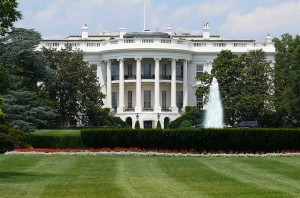Generations of Pride: White House Hosts Panel on LGBT Stories

On June 27, I had the pleasure of attending “Generations of Pride: A Celebration of LGBT Stories” at the White House. The auditorium was bursting with young, enthusiastic leaders, most of whom are completing internships here in DC for the summer. The event consisted of a panel of four individuals, young and old alike, whose life experiences within the LGBTQ community had recently been recorded and added to the StoryCorps archives; if you listen to NPR you’ve probably heard similar interviews before. StoryCorps is the nonprofit that collects these interviews with the belief that they have human value, are important, and can change minds. So far the organization has collected and archived more than 45,000 interviews with nearly 90,000 participants and just released their new campaign, “OutLoud,” amplifying the voices of the LGBTQ communities.
The four panel members chose a story from the LGBTQ archive, one they felt a connection with, and introduced it to the audience. After each story, the moderator would ask the panelist why they chose that story and then ask some personal questions about their own personal story. The panelists were chosen with the help of SAGE, which stands for “Services and Advocacy for GLBT Elders,” the country’s largest and oldest organization dedicated to serving the LGBTQ community. These two organizations, combined with the White House Office of Public Engagement, hosted a momentous event where cross-generational dialogue was able to rejuvenate ideas and enthusiasm surrounding the LGBTQ movement.
The panelists consisted of an African American gay man who works with churches and religious organizations in the DC area to raise awareness about AIDS and HIV; a young African American lesbian originally from Ghana who was thrown into the American foster care system at a young age and met fellow LGBT friends who helped her grow into the strong, confident woman she is today; a young woman from North Carolina who identifies as a transgender woman and works to fight inequality so the next generation doesn’t have to; and a lesbian who has been with her partner for twenty-four years, was a captain in the Navy until 2002 when she retired, and worked tirelessly to end “Don’t Ask Don’t Tell.”.
Some similarities come to mind when considering the LGBTQ movement and the “rise of the nones” or the non-religious movement. Historically, the LGBTQ community has been discriminated against in several ways and many have had to hide the truth from their families, friends, co-workers, and bosses. The non-religious community is also experiencing some of this discrimination, and hearing the stories from members of a community who have talked the talk and walked the walk was inspiring and enlightening.
There was a generational difference when responding to a question an audience member asked: “What can we (allies and the LGBTQ community members) do to build awareness and understanding?” The young African American woman answered with a bold statement: “A marginalized community does not have the obligation to educate. That is not our responsibility.”
Although not on stage, I later learned that there was disagreement with that statement from another panelist. I ran in to LGBTQ activist and U.S. Navy Captain Joan Darrah while I was leaving the event and walked with her to the Metro. I asked her what words of wisdom she could give to someone who is involved with the non-religious movement and fighting for equality, as our movement is still lagging behind the LGBTQ movement. Her response seemed so simple: Educate people. As a Unitarian Universalist, Captain Darrah said she had known many atheists and non-religious folks and couldn’t understand why some people have problems with nonbelievers. Captain Darrah also mentioned that she was still in utter disbelief at the fact that not only was DADT repealed, but that DOMA has been widely struck down and she was able to marry her life partner, something she never thought she would be able to do.
My take-away from this experience? Intergenerational approaches are always best. We may think that generations to come are going to get more and more inclusive and understanding as time goes on, but there are many chipped shoulders coming up as well. Young people may not feel the need to educate potential non-religious allies, thinking that it isn’t “their responsibility.”Although from an older generation, Captain Darrah could see the value in educating people who may not be directly involved in the community but are willing to fight for equality and justice regardless. As she remarked before we parted, “DADT wasn’t repealed just because of the LGBT community; we needed straight white men, too!” Just as we need atheists and humanists to publicly identify as being good without a god, we also need religious people to stand up against inequality and injustice with us.
If someone doesn’t understand your lack of belief, take the time to educate them. Make it your responsibility to educate them. That is the only way we will see real change.
